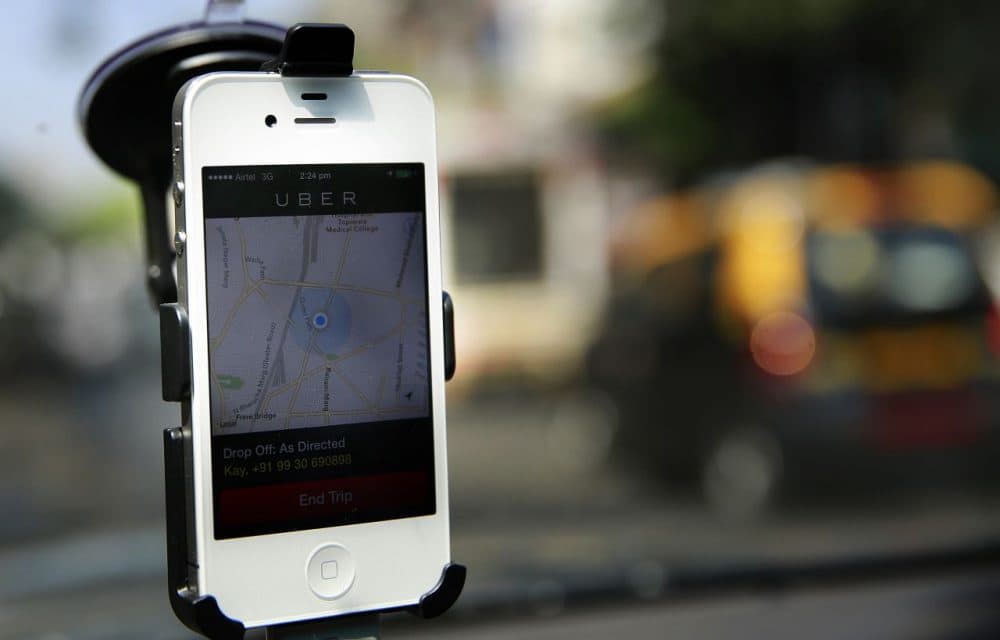Advertisement
Key Mass. Lawmakers Say Ride-For-Hire Bill Likely A 2015 Topic

Gov. Deval Patrick's late-term push to regulate alternative taxi-services like Uber and Lyft may need an assist from the next governor with legislative leaders raising issues unaddressed by the administration's proposal and top House and Senate Democrats suggesting action is unlikely before Patrick leaves office.
Patrick has proposed new regulations that would subject the popular transportation services to state oversight, and his administration plans to file legislation to give authority to the Department of Public Utilities to enforce the new rules.
"I think the regulations are a good idea. The timing may be, no pun intended, a heavy lift," said Rep. William Straus, a Mattapoisett Democrat and House chair of the Transportation Committee.
Uber and Lyft, which allow users to book rides in town cars and other vehicles through their smartphones, have come under scrutiny in Massachusetts and around the country over public safety concerns, and the taxi industry opposes their ability to operate unregulated in cities like Boston.
But the administration's last ditch attempt to enforce new safety and insurance rules for Uber and Lyft drivers could be just the tip of the issue for lawmakers.
"I think that in order to provide an assurance to the public about how the operation is run from a safety and insurance standpoint, the idea of the regulations is appropriate," Straus said. "I do know from my own perspective there are other issues with Uber that might come into play next session in the areas of data privacy."
Draft regulations that will be the subject of a Dec. 31 hearing held by the Department of Transportation would require drivers to be 21 with a valid driver's license and proof of personal motor vehicle insurance.
The transportation networks would also be required to have "appropriate liability insurance," and cars would be prohibited from picking up passengers on the sidewalk that had not scheduled a ride through their smartphones with a specified pick-up and drop-off location. Drivers would also be subjected to criminal background checks, and prohibited from driving for a service if they have certain crimes on their record, or a history of traffic violations.
Advertisement
"The Patrick Administration is committed to ensuring the public's safety and at the same time, supporting innovation in transportation. We are diligently making progress on issues related to rideshare, and will be working hard on this front through inauguration day," spokeswoman Mary-Leah Assad said.
Without commenting on the specifics of the plan, Governor-elect Charlie Baker said he was open to the governor's effort. Even if the regulations are approved, Baker or another lawmaker may have to file a bill in the next session to given enforcement authority to the DPU or another agency.
"Governor-elect Baker feels it is appropriate to regulate companies like Uber and Lyft to ensure that drivers are properly screened and the companies are properly insured. Technology driven ride share programs could have significant benefits and the Governor-elect hopes there is a place for these companies and taxis in Massachusetts," spokesman Tim Buckley said in a statement.
Sen. Thomas McGee, a Lynn Democrat and co-chair of the Transportation Committee, said it would be "a stretch" to think the Legislature could act before Patrick leaves office on Jan. 8. Though he had not yet read the proposed regulations, McGee said he expected the issue to be controversial with many varied opinions from city leaders, taxi companies and Uber and Lyft.
"This is an issue that goes beyond Massachusetts," McGee said.
Patrick's proposal would empower the state to assume the oversight of ride-sharing outfits like Uber, while the regulation of taxi services has traditionally been the domain of cities and towns.
A spokeswoman for Boston Mayor Marty Walsh said the mayor remains willing to engage with the state.
"It doesn't change what the mayor has said up to this point. He continues to believe Uber is an innovative service," said spokeswoman Kate Norton. "At this point, we don't have any plans to stop the progress we're making with the Taxi Advisory Commission."
Taxi industry advocates said the proposed regulations left unanswered questions about insurance for the vehicles used to transport passengers, and questioned why Patrick would make such a late effort to legitimize companies they say are operating in violation of state rules.
"Clearly people are going way out of their way to accommodate a company that in my experience most public officials would usually run from," said Stephen Regan, a spokesman for the Massachusetts Regional Taxi Advocacy Group. "It's an odd marriage."
Regan questioned whether an insurance company would ever pay a claim on a personal motor vehicle policy, required by the draft regulations, if the car or SUV was being used for commercial purposes.
"He's probably pissed off a lot of mayors, because there is a state law which provides the authority to every municipality to design their own ride-for-hire regulations," Regan said. "This would end-run that for transportation network companies."
Straus said Regan raised a legitimate concern that should be explored.
"In many cases, personal or private auto insurance policies will exclude using your vehicle for hire. It may need more discussion about insurance and what should be included in a policy," he said.
Straus also said lawmakers in the next session, which begins on Jan. 7, may want to consider how best to protect the privacy of people that use alternative taxi services like Uber.
"The notion, from a data standpoint, that people are having their movement tracked by the vendor is offensive to most people," he said.